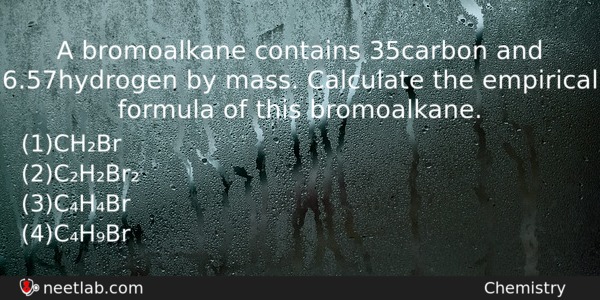| ⇦ | 
| ⇨ |
A bromoalkane contains 35% carbon and 6.57% hydrogen by mass. Calculate the empirical formula of this bromoalkane.
Options
(a) CH₂Br
(b) C₂H₂Br₂
(c) C₄H₄Br
(d) C₄H₉Br
Correct Answer:
C₄H₉Br
Explanation:
1) Assume 100 g of the compound is available:
C ⇒ 35 g
H ⇒ 6.57 g
Br ⇒ 58.43 g (from 100 minus 41.57)
2) Determine moles:
C ⇒ 35 g / 12 gmol = 2.917
H ⇒ 6.57 g / 1 g/mol = 6.57
Br ⇒ 58.43 g / 80 g/mol = 0.730375
3) Divide by smallest to seek lowest whole-number ratio:
C ⇒ 2.917 / 0.730375 = 4
H ⇒ 6.57 / 0.730375 = 9
Br ⇒ 0.730375 / 0.730375 = 1
C₄H₉Br
Related Questions: - 100 cm of a given sample of H₂O₂ gives 1000 cm³ of O₂ at STP. The given sample is
- Addition of phosphate fertilizers into water leads to
- Glycerine is purified by
- Two different gases enclosed in different flasks A and B at same temperature and pressure
- Carbon percentage is maximum in
Question Type: Memory
(964)
Difficulty Level: Easy
(1008)
Topics: Basic Concepts of Chemistry
(94)
Subject: Chemistry
(2512)
Important MCQs Based on Medical Entrance Examinations To Improve Your NEET Score
- 100 cm of a given sample of H₂O₂ gives 1000 cm³ of O₂ at STP. The given sample is
- Addition of phosphate fertilizers into water leads to
- Glycerine is purified by
- Two different gases enclosed in different flasks A and B at same temperature and pressure
- Carbon percentage is maximum in
Question Type: Memory (964)
Difficulty Level: Easy (1008)
Topics: Basic Concepts of Chemistry (94)
Subject: Chemistry (2512)
Important MCQs Based on Medical Entrance Examinations To Improve Your NEET Score
18000+ students are using NEETLab to improve their score. What about you?
Solve Previous Year MCQs, Mock Tests, Topicwise Practice Tests, Identify Weak Topics, Formula Flash cards and much more is available in NEETLab Android App to improve your NEET score.
Share this page with your friends

Leave a Reply